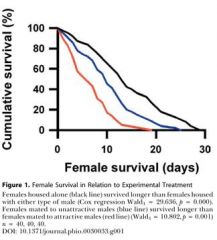Grade Level(s):
- 13-16
Source:
- UC Museum of Paleontology
Resource type:
- Annotated journal article
Time: 1 hour
Overview
Students read a 2005 paper on the fitness consequences of mate choice alongside an interactive guide that asks the reader to answer key questions about each section of the article.

- [Mechanisms of evolution: Grades 13-16] Inherited characteristics affect the likelihood of an organism's survival and reproduction.
- [Mechanisms of evolution: Grades 13-16] Sexual selection occurs when selection acts on characteristics that affect the ability of individuals to obtain mates.
- [Mechanisms of evolution: Grades 13-16] An organism's fitness depends on both its survival and its reproduction.
- [Mechanisms of evolution: Grades 13-16] Fitness is often measured using proxies like mass, number of matings, and survival because it is difficult to measure reproductive success.
- [Nature of science: Grades 13-16] Scientific knowledge is open to question and revision as we come up with new ideas and discover new evidence.
- [Nature of science: Grades 13-16] A hallmark of science is exposing ideas to testing.
- [Nature of science: Grades 13-16] Scientists test their ideas using multiple lines of evidence.
- [Nature of science: Grades 13-16] Scientists can test ideas about events and processes long past, very distant, and not directly observable.
- [Nature of science: Grades 13-16] Scientific findings and evidence inspire new questions and shape the directions of future scientific research.
- [Nature of science: Grades 13-16] Science is a human endeavor.
- [Studying evolution: Grades 13-16] Scientists use experimental evidence to study evolutionary processes.
There are no NGSS/DCI concepts currently linked to this resource.
This article works best as part of an extended engagement with the primary literature. To see how to use this article as part of an undergraduate journal club or discussion section, visit The Journal Club Toolkit.
